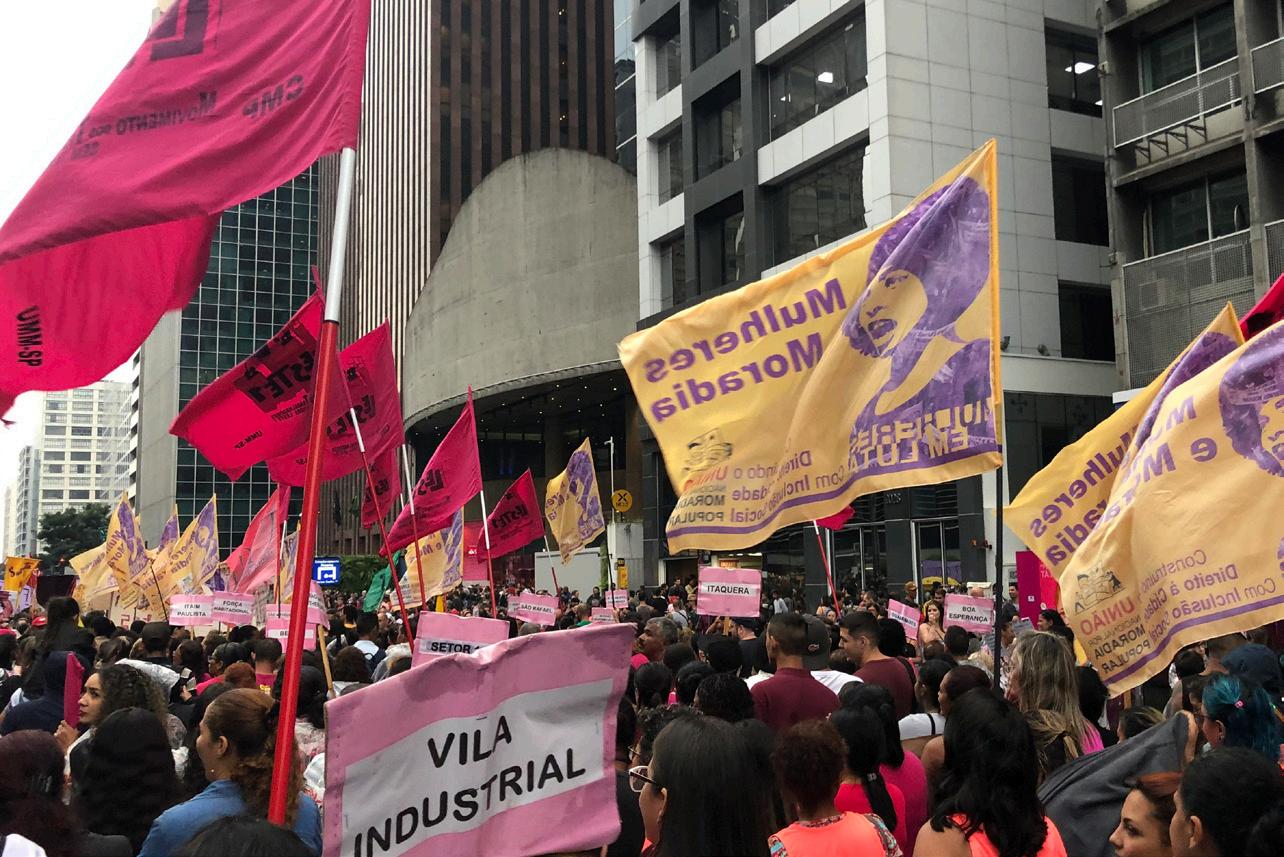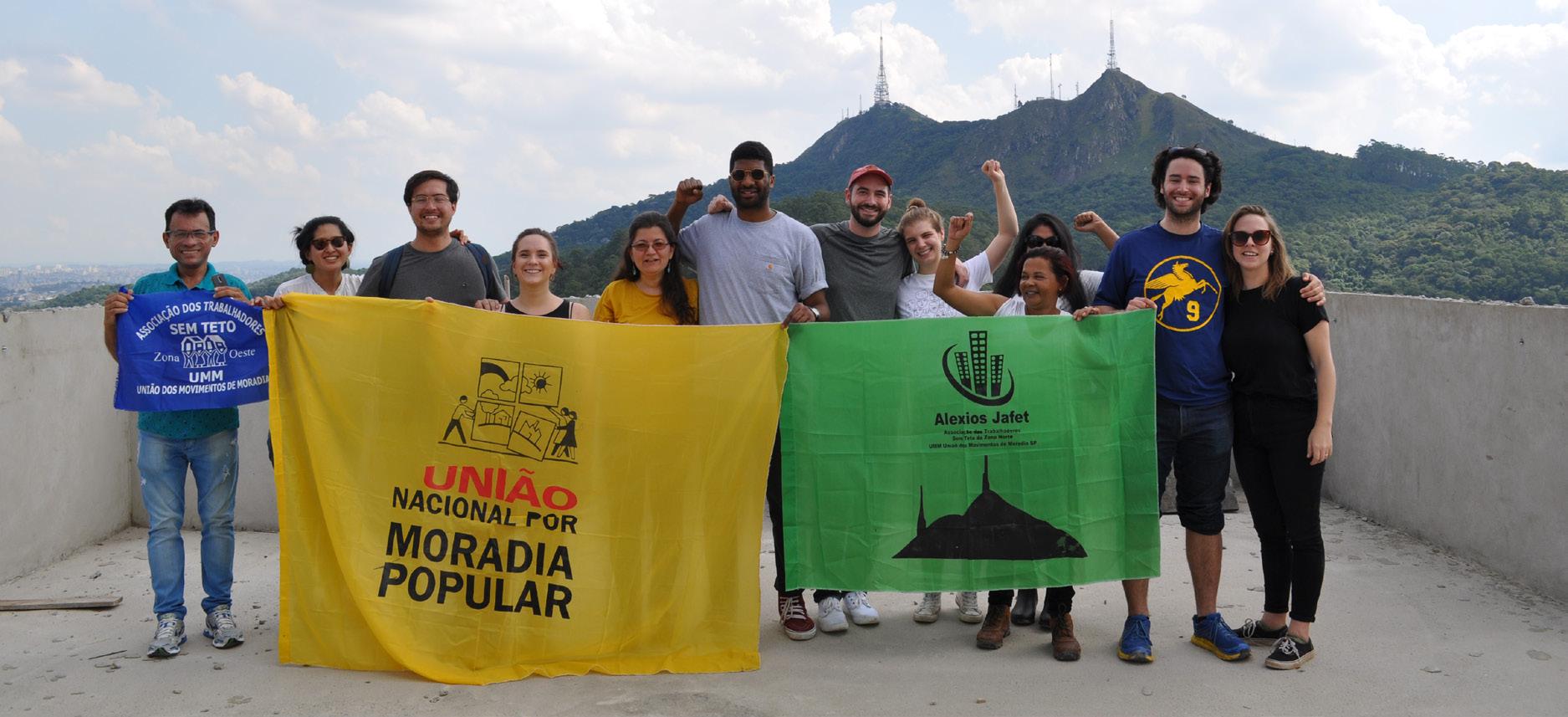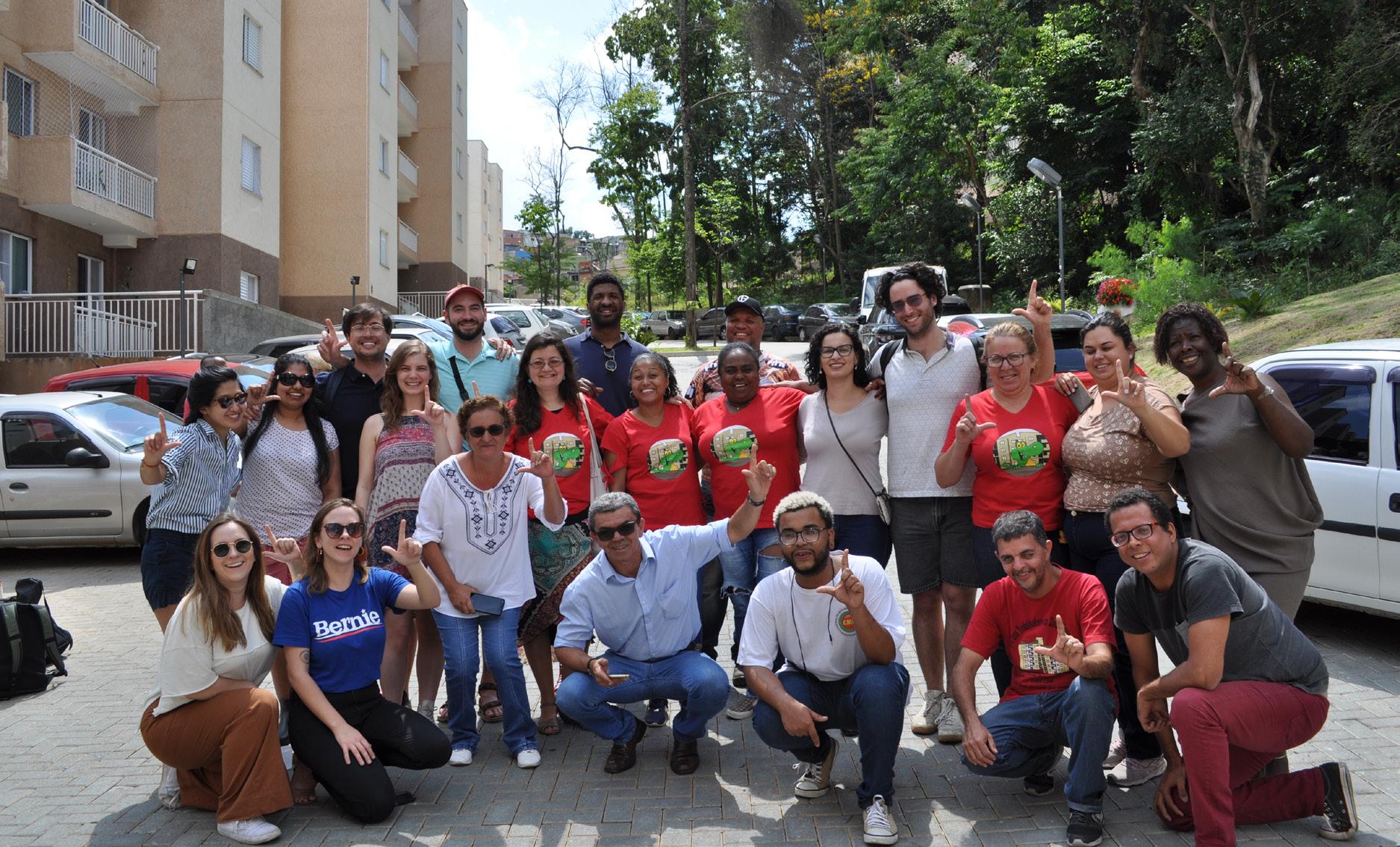
7 minute read
01 EXECUTIVE SUMMARY � � � � � � � � � � � � � � � � � � � � � � � � � � � � � � � � � � � � � � � � � �
from Self-Management Law, Now! Fostering Community-Owned, Permanently Affordable and Sustainable Housing
# 01
EXECUTIVE SUMMARY
Brazil, like many countries around the world, is experiencing a severe and growing housing deficit as a result of a dramatic mismatch between production and need. The provision of services and urban infrastructure often benefit the wealthy while underserving low-income populations, reinforcing and exacerbating inequality. Housing available for lowincome populations is frequently inadequate, unaffordable, and unstable. In response, members of social movements demand more: their solution is autogestão (self-managed) housing, democratically produced and governed through practices of mutirão (mutual aid), collective property, and joint effort. In the past several decades, housing programs like Fundo de Atendimento à População Moradora em Habitação Subnormal (Fund for Assistance to the Dwelling Population in Substandard Housing, or FUNAPS), Solidarity Credit Program, and Minha Casa Minha Vida Entidades (My House My Life Entities, or MCMV-E) have provided funding for social housing production, but have proven to be extremely vulnerable to changing political administrations. This is evidenced most recently by the gutting of MCMV-E and the dissolution of the Ministry of Cities under the Bolsonaro administration. Projects funded by MCMV-E that were under construction and nearing completion have therefore stalled due to lack of funding, with thousands of units sitting vacant as millions of low-income Brazilians are in need of stable housing. The 2020 Integrative Fieldwork Experience Capstone Team from the University of Michigan compiled this report as a means of summarizing our analysis of the housing issues facing Brazilians, the solutions proposed by the dedicated social movements that represent them, and our work in supporting these movements to advance housing as a fundamental right. The capstone team partnered with the National Union for Popular Housing (UNMP), the Union of Housing Movements (UMM-SP), and the Landless Workers of the East District 1 (MST-Leste 1). The team produced two main deliverables. The first is an interactive website that publicizes and promotes autogestão housing, highlights successful housing projects through an interactive map, and, most importantly, disseminates UNMP’s draft bill that creates a stable legal framework for the continued production of housing under this model. The website acts as a toolkit for a wide array of promotional and educational materials — described in detail below — intended for a wide audience ranging from laypersons to organizers to academics to politicians. In response to the drafted bill, the team also developed a memorandum on suggestions for further development of the bill, specifically to advance the legitimization of collective property as an option for self-managed housing and to address potential barriers to land acquisition. The second main deliverable is the Environmental Engagement Suite, which includes a set of flexible resources to help self-managed housing projects meet environmental protection requirements, address serious environmental vulnerabilities on their land, and overcome major financial and logistical barriers associated with those tasks.
The capstone team visited the São Paulo Metropolitan Region in March 2020. During that time, the team toured and documented 12 housing sites produced under autogestão. These experiences enriched our understanding of the housing crisis in Brazil and the work the movement is doing to confront the crisis through
autogestão. Most importantly, we were given the opportunity to talk with the members of the movement and to hear their powerful stories of struggle and optimism.
Before our fieldwork trip, the team produced an in-depth background research report. This report provides a comprehensive look at Brazilian land use policy, property regimes, housing policy and finance, and key social movements. The report also characterizes the severe housing crisis in Brazil by closely examining the issues São Paulo faces in particular. This aspect of the project was not developed for the client, but rather acted as a learning experience for the team — ensuring we were well-informed and prepared for our fieldwork — and provides the essential context needed for readers of this report. With the materials gathered through the fieldwork trip, the team worked to advance selfmanaged housing with two main strategies:
• Promote UNMP’s Legal Framework
for Self-Management Law, which makes third-sector organizations legitimate and secure housing producers in Brazil and calls on the federal government to provide a permanent stream of funding and support for autogestão housing and related expenses.
This draft bill would provide the resources and governmental recognition to scale up the production of autogestão housing in Brazil, which has proven to be a viable and equitable alternative to the developer-led housing market. The deliverables related to legislative development and advocacy include:
• Lei da Autogestão Já (Self-
Management Law Now) Website.
The website houses each of the subdeliverables below, providing rich and easily accessible information to the public about the law and related information. The website will be handed off to UNMP at the conclusion of this capstone project so that they may adapt it as needed. The website serves as an educational advocacy tool for the movement, with a specific eye toward promoting the legislation.
• Educational materials. The team developed three flyers that provide information on 1) the housing problem in Brazil, 2) autogestão, and 3) collective property. The team determined that knowledge related to these three topics was essential to increasing the public’s understanding of the bill and to justifying its promotion. The educational materials are included on the website and are also downloaded and printable as brochures.


• Documentary Autogestão, Já! and
resident testimonials. The 15-minute documentary, produced from over 10 hours of footage by the team, is both an educational tool and a promotional video. It tours a variety of self-managed housing projects; provides expert interviews from residents, movement members, and technical advisory professionals; and, most importantly, highlights the powerful impact that autogestão has had on its residents. The team additionally produced brief three minute resident testimonials for each housing project we visited, providing a more intimate, in-depth study of residents’ stories and how autogestão has changed their lives. These videos are extremely powerful and give an essential voice to information provided on the rest of the website.
• Interactive self-managed housing
project map. The map shows all selfmanaged housing projects in Brazil, distinguishing between housing built under MCMV-E, Solidarity Credit,
and FUNAPS-Comunitário. The map demonstrates the success of autogestão housing under the various programs, allowing one to imagine the scale of housing that could be produced under a stable program with a reliable funding stream, which would be provided under the drafted bill. • Case studies. The team conducted research into five case studies of selfmanaged housing in Latin America (Uruguay, Argentina, Costa Rica,
Venezuela, and El Salvador). These case studies cover background and key principles, implementation and impact, financing, governance structure, and enabling legal and political frameworks.
The case studies are intended to provide inspiration and normalize autogestão and collective property housing models.
• Memorandum on Common
Collective Property Models and
Legislative Development. The memo, which is not available on the website but has been given directly to
the client, examines three common collective property models: limitedequity cooperatives, zero-equity cooperatives, and community land trusts. The memo draws from real-life examples of these models to provide legislative recommendations for adoption in the bill and drafts model articles for the movement to consider. In addition, the memo considers legal opportunities to address land acquisition challenges that self-managed housing projects have previously faced amid other housing programs.
• Support self-managed housing projects in addressing environmental preservation through the development of the Environmental
Engagement Suite. Many movementproduced project sites contain a Permanent
Preservation Area (APP), which entails strict planting standards and natural preservation requirements as well as expensive and logistically challenging procedures. We worked with the Mutirões
Dorothy Stang, Jerônimo Alves e Martin
Luther King housing project, currently under construction, as a pilot site, assisting the members of this project in navigating the requirements of the APP and engaging with their natural landscape. The capstone team also held an on-site participatory planning workshop with members of the site’s environmental commission. This workshop allowed members to discuss and debate options for community spaces in the development, keeping in mind the requirements of the APP. Based on our work with the pilot site and results from the workshop, we developed a suite of resources that act as a starting point for any project with the need to address environmental preservation. The suite includes: • An introduction to environmental protection laws in Brazil;
• A starter guide on designing for APPs; and
• A schematic design proposal using the pilot site as a case study.
In order to meet the requirements of the
APP and create productive community spaces in this project, the movement needs additional funding. With that in mind, the team plans to apply to various sustainability, community development, and housing grants. Due to the COVID-19 pandemic, many grants have been delayed or cancelled for this year. Under these circumstances, the team continues to search for grants, but will also create a resource document with grant information that a future capstone team or the movement itself can use to apply for funding down the road. Through this work, we hope to contribute in some small way to the efforts of these social movements and to provide housing that fits the needs of low-income Brazilians.









